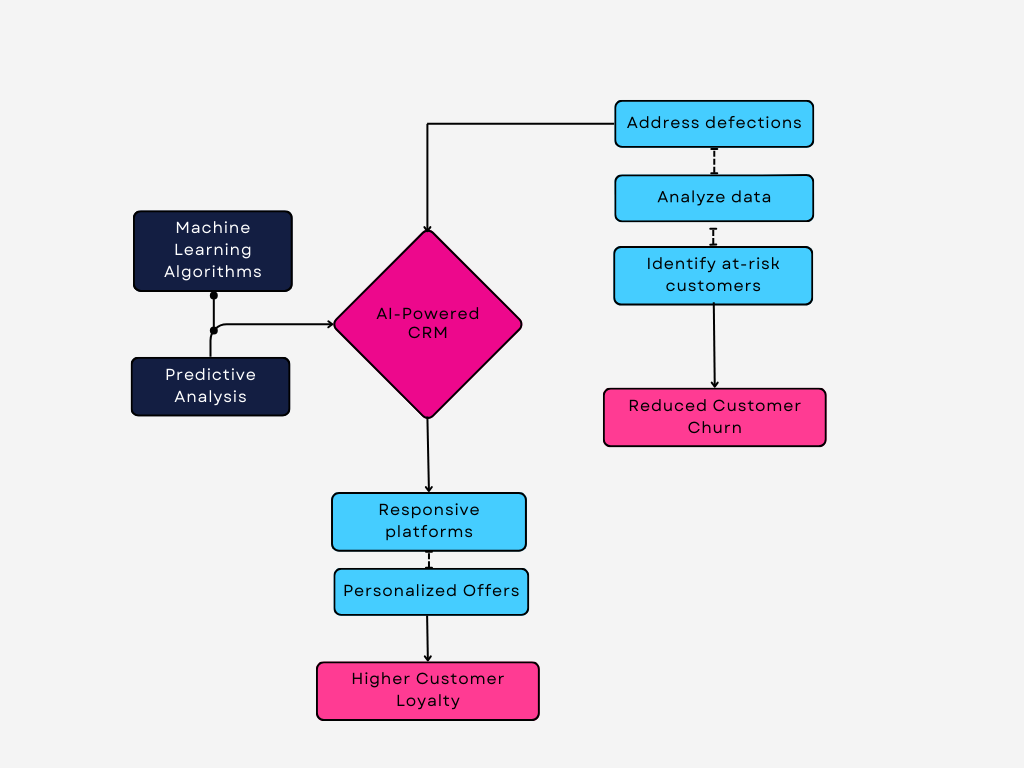The journey of integrating artificial intelligence into CRM (customer relationship management) systems, also known as AI CRM, unfolds through a variety of applications, from chatbots that offer immediate customer service enhancement to sophisticated data privacy measures ensuring customer trust. This shift towards AI-powered CRM, utilizing some of the best AI software and best CRM software available, is redefining the parameters of customer satisfaction and loyalty, highlighting the pivotal role of technology in shaping the future of business-customer relations.
How AI Enhances CRM Capabilities
Data-Driven Insights
AI transforms CRM systems from simple data repositories into strategic assets that drive growth and enhance customer experiences. By performing data cleansing on CRM data to remove duplicates and inaccuracies, AI ensures the data is standardized, setting the stage for accurate customer data analysis and customer insights. Integrating CRM with other data sources like marketing automation tools and social media channels enriches customer profiles, allowing AI algorithms to deliver meaningful insights through techniques like natural language processing and sentiment analysis.
Automated Workflows
Automation of CRM workflows greatly enhances productivity by managing repetitive tasks. This technology supports everything from lead management to interacting with customers, making sure that follow-ups are prompt and processes run smoothly. For example, a CRM system can automatically evaluate leads using lead scoring models, improving overall efficiency and enabling data-driven decision-making.
Predictive Customer Behavior
AI powered tools in CRM systems leverage machine learning to enable customer behavior prediction, allowing businesses to tailor interactions and proactively address customer needs. Predictive analytics help in segmenting customers based on behavior, enhancing marketing personalization and driving engagement. This lets businesses foresee what customers might want, fine-tune account-based marketing strategies, and improve both conversion rates and customer retention.
Real-World Applications of AI in CRM
Retail and E-commerce
In the retail sector, AI is revolutionizing marketing and customer service across the omnichannel presence. According to the BDO’s 2024 Retail CFO Outlook Survey, over half of retailers are actively integrating generative AI to enhance personalization and operational efficiency. AI-driven systems in retail help in creating dynamic pricing strategies and personalized marketing, significantly impacting customer engagement sales performance analysis..
Healthcare
AI-based CRM systems in healthcare are transforming patient care by providing personalized treatment plans and managing health data efficiently. These systems enhance patient engagement through automated reminders and tailored health information, significantly improving patient outcomes and satisfaction. Moreover, AI-driven predictive analytics in healthcare CRM can identify at-risk patients early, potentially saving lives and reducing costs.
Ethical Considerations and Challenges
Privacy and Data Security
Adding AI to CRM systems raises serious concerns about how sensitive customer data, particularly personally identifiable information (PII), is managed. To prevent misuse or unauthorized access, it’s important to focus on data minimization by collecting only what’s essential. Using strong encryption for data both at rest and in transit, plus having tight access controls, are key steps to protect customer information from hacks or breaches.
Bias and Fairness
The deployment of even the best AI for business in CRM also brings to light issues of bias and fairness. Non-representative training data is a significant source of bias, potentially leading AI systems to make unfair or prejudiced decisions. Businesses must strive for transparent and explainable AI models, employing regular audits and involving diverse stakeholders in the development process to mitigate these biases and promote fairness.
Transparency
Transparency is always essential for building trust and ensuring ethical usage. AI models must be understandable and accountable, with clear documentation of their decision-making processes and the data used. This includes implementing interpretability methods and model explainability tools to provide insights into AI decisions, thus enabling users to scrutinize and validate these decisions effectively.
Impact on Business Metrics
Reduced Customer Churn
AI helps reduce customer churn by predicting and addressing potential defections before they happen.Through machine learning algorithms, companies analyze customer data to identify at-risk customers, offering personalized interventions like loyalty rewards or improved service quality to retain them. This proactive strategy significantly lowers churn rates and enhances overall customer satisfaction.
Higher Customer Loyalty
The integration of AI in CRM systems transforms traditional loyalty programs into dynamic, responsive platforms. By using predictive analytics, AI anticipates customer needs and delivers timely, relevant offers, thereby fostering a foundation for deep, lasting customer loyalty. Additionally, AI’s ability to detect and prevent fraud within loyalty programs further secures customer trust and strengthens the integrity of business-customer relationships.

Conclusion
The dynamics of customer interactions are fundamentally altered, showcasing a future powered by AI-driven CRM systems. Businesses not only understand their customers more deeply but also anticipate their needs with unprecedented precision. This digital evolution signifies a leap towards fostering stronger, more meaningful relationships between businesses and their clients, thereby setting new benchmarks for customer satisfaction and loyalty.
At Prodware, we understand the hurdles that come with developing an impactful Customer Experience strategy. Our CX consulting services are designed to guide you in identifying the steps necessary to elevate your business. Together, we’ll explore tailored solutions and tools that address your unique challenges. Don’t hesitate to get in touch!






